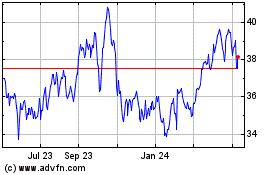Oil Companies Begin to Benefit From Cost Cuts
April 29 2016 - 8:40AM
Dow Jones News
By Sarah Kent
LONDON--The price of oil hit a 13-year low during the first
three months of 2016. But early financial results show that some of
Europe's biggest energy companies performed better last quarter
than they have in months.
BP PLC said earlier this week its net loss shrunk nearly 80%
from the prior quarter. On Wednesday France's Total SA and Norway's
Statoil ASA said they were back in the black last quarter after
suffering losses in the last three months of 2015. And while
Italian oil giant Eni SpA said Friday it had racked up a nearly
billion-dollar loss for the quarter, its share price remained flat
in early trading since the loss wasn't as bad as many investors
predicted.
The results reflect aggressive cost cuts the companies have made
to cope with a nearly two-year slump in crude prices. It isn't yet
clear if U.S. rivals have made similar progress-- Exxon Mobil Corp.
and Chevron Corp. report earnings later on Friday. Analysts
forecast Exxon will report the lowest quarterly profit since it
bought Mobil in 1999. Chevron is expected to report a
second-consecutive quarterly loss for the first time in a
quarter-century. ConocoPhillips this week reported a $1.47 billion
loss for the quarter after making a profit a year earlier.
Beyond individual companies' performance, there has been
widespread optimism in market recently, as oil prices have jumped
22% since the beginning of April.
In the U.S., the extreme belt tightening by oil companies is
finally leading to declines in crude output that could help
rebalance the global market. Federal figures show U.S. oil
production fell below 9 million barrels a day a few weeks ago,
after peaking at 9.7 million in April 2015.
"Industry spending could be set to decline to levels not seen
since 2007," analysts at Citi Research said Monday, adding that
additional cuts "should be sufficient to deliver the necessary
declines in global production, with balance appearing within reach
in the second half of 2016."
By any measure, the first quarter of 2016 was a bad one for oil
companies. For the most part, their profits were sharply lower
compared with a year earlier, and they spent more cash than they
brought in. But the European companies' earnings represented an
improvement over more recent results, to the surprise of investors
and analysts such as Bernstein Research, which last week said the
beginning of 2016 would be "the zero earnings quarter."
Instead, big cost cuts in areas like staffing levels and
exploration budgets since 2014 helped the companies generate
results that were an improvement on the past quarter. Combined with
a recent uptick in oil prices, that has helped boost the companies'
share prices in recent days.
BP's shares rose more than 4% Tuesday after it announced its
first-quarter results. Statoil's share price also shot up over 4%
Wednesday, while Total traded 2% higher. That was due partially to
low expectations among investors.
"This industry has overpromised and under-delivered for a decade
so it isn't surprising when executives said 'we can cut costs,'
there was some skepticism," said Chris Wheaton, a portfolio manager
at Allianz Global Investors "But actually they are delivering ahead
of their own expectations."
BP said Tuesday its costs over the last 12 months were $4.6
billion lower than in 2014, and earlier this year announced plans
to cut 7,000 jobs. Total said it is on track to hit its targeted
$900 million of savings this year and has managed to squeeze
production costs while increasing output. Statoil bolstered its
first quarter by reversing $308 million-worth of impairments after
driving down project costs.
"These businesses have been in the past run along fairly flabby
lines in terms of cost control," said Richard Hulf, a manager at
Artemis Investment Management's global energy fund. "This oil price
has caused people to take another look at operations so I think
we're seeing for the first time what a properly managed oil
business looks like."
That kind of optimism may not extend to U.S. shale producers,
typically smaller companies grappling with high debt. At a
conference Wednesday, Scott Sheffield, the chief executive of U.S.
producer Pioneer Natural Resources Co.--which reported a $267
million first-quarter loss--warned that "there's more debt in this
downturn than I've ever seen." That may force companies to make big
payments before ramping up production even if the oil price goes
up.
Erin Ailworth
,
Bradley Olson
and
Alison Sider
contributed to this article.
(END) Dow Jones Newswires
April 29, 2016 08:25 ET (12:25 GMT)
Copyright (c) 2016 Dow Jones & Company, Inc.
BP (NYSE:BP)
Historical Stock Chart
From Mar 2024 to Apr 2024

BP (NYSE:BP)
Historical Stock Chart
From Apr 2023 to Apr 2024
